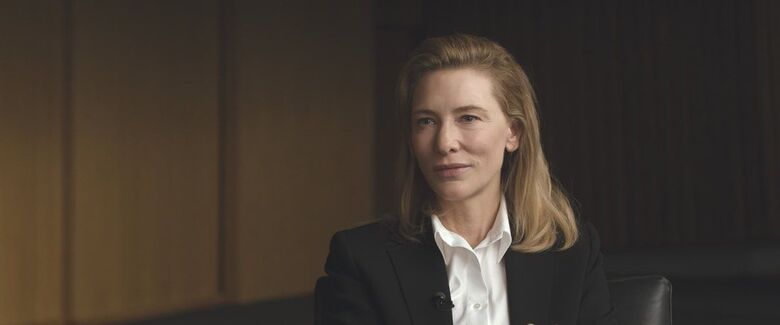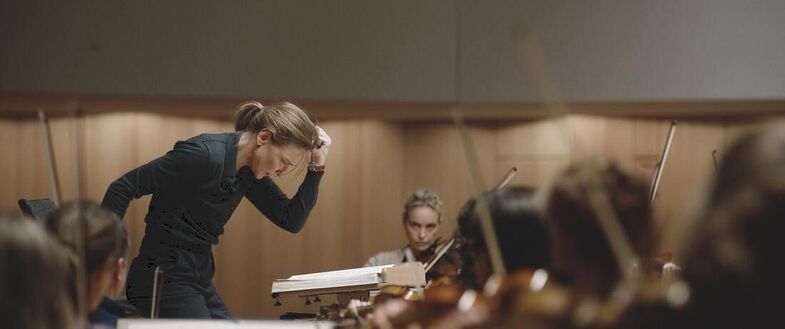TÁR
*****
Director: Todd Field
Screenplay: Todd Field
Principal cast:
Cate Blanchett
Noémie Merlant
Nina Hoss
Sophie Kaver
Mark Strong
Julian Glover
Country: USA
Classification: M
Runtime: 158 mins.
Australian release date: 26 January 2023.
In a role that should garner her an Oscar, Cate Blanchett gives the performance of her career to date in Todd Field’s Tár. She is phenomenal! She plays a brilliant but predatory conductor whose arch rhetoric is as devastating as her manipulative behaviour, a woman completely obsessed with getting what she wants regardless of the consequences. Unusually, Tár opens with lengthy credits that would normally play at the movie’s end, giving the audience a clue to the chronological deviation it’s about to witness – the story hops backwards and forwards over the course of a couple of years. It is a rather disconcerting start but it makes you sit up and pay attention to Field’s complex and disturbing plot about the dizzying fall from grace of the first female conductor of the Berlin Philharmonic Orchestra.
Lydia Tár (Cate Blanchett) is a self-described “U-Haul lesbian” (referring to the stereotype that lesbians tend to move in with each other after a short period of time) who is married to the Philharmonic’s concertmaster and first violinist, Sharon (Nina Hoss), with whom she has an adopted daughter, Petra (Mila Bogojevic). Her behaviour towards those around her, both personal and professional, is appalling; she ruthlessly discards her ex-lovers, colleagues and acolytes when they are no longer useful to her. In an early sequence, while guest teaching at the Julliard School, Tár brutally belittles a student’s opinion of Bach to the point where he storms out, humiliated, and the maestro’s modus operandi is revealed - she doesn’t suffer fools gladly - but it’s behaviour that will return to haunt her later on. Her actions have consequences, especially in the current age, when every interaction can be recorded on a mobile phone. During a subsequent interview conducted at The New Yorker Festival, we learn that she is writing her memoir (humbly called Tár on Tár) and planning to conduct Mahler’s Fifth Symphony, considered to be a significant challenge for any conductor. Her loyal aide and student Francesca (Noémie Merlant) spends much of her time protecting Tár from those she has compromised, particularly one past student and sexual conquest, Krista (Sylvia Flote), whose family is threatening to sue her. When the maestro reveals that she intends to replace her assistant conductor (Allan Corduner) with someone other than Francesca, the hurt subordinate resigns. This is yet another cruel incident that will have repercussions for Tár. Adding to the mounting challenges she is facing is the arrival of a new cellist, Olga (Sophie Kauer), a young woman on whom Tár becomes fixated, and suddenly her cherished, privileged life starts to dramatically unravel.
Tár is a film about power, its abuse and the corrosive effect it can have on those who wield it carelessly. As with Todd Field’s previous feature-length works, 2001’s In the Bedroom and 2006’s Little Children, the film provides no easy answers to the questions it raises. In his screenplay, Field has Tár say of the composer J. S. Bach, he “knows that it’s always the question that involves the listener. It’s never the answer,” and the same could be said of the writer/director’s movie. It’s been criticised in some quarters for being “anti-woman” but where is it written that all females in film must be likable? There are countless dramas about despicable men, why is it wrong to show the machinations of a bullying, predatory woman? At least Lydia Tár is depicted warts and all, a fully realised portrait in living colour rather than a mere sketch, a cypher. You may not like her but it’s refreshingly provocative to spend time in her company. And, of course, Tár has a superb soundtrack (including the famous Fifth) and a score by the acclaimed Icelandic composer and cellist Hildur Guðnadóttir. It’s odd that the film didn’t gain an Oscar nomination for Best Original Score to go along with its six others, including Best Picture, Best Director, Best Original Screenplay and Best Actress in a Leading Role. Don’t miss Tár – I doubt you’ll see a better film all year.
Screenplay: Todd Field
Principal cast:
Cate Blanchett
Noémie Merlant
Nina Hoss
Sophie Kaver
Mark Strong
Julian Glover
Country: USA
Classification: M
Runtime: 158 mins.
Australian release date: 26 January 2023.
In a role that should garner her an Oscar, Cate Blanchett gives the performance of her career to date in Todd Field’s Tár. She is phenomenal! She plays a brilliant but predatory conductor whose arch rhetoric is as devastating as her manipulative behaviour, a woman completely obsessed with getting what she wants regardless of the consequences. Unusually, Tár opens with lengthy credits that would normally play at the movie’s end, giving the audience a clue to the chronological deviation it’s about to witness – the story hops backwards and forwards over the course of a couple of years. It is a rather disconcerting start but it makes you sit up and pay attention to Field’s complex and disturbing plot about the dizzying fall from grace of the first female conductor of the Berlin Philharmonic Orchestra.
Lydia Tár (Cate Blanchett) is a self-described “U-Haul lesbian” (referring to the stereotype that lesbians tend to move in with each other after a short period of time) who is married to the Philharmonic’s concertmaster and first violinist, Sharon (Nina Hoss), with whom she has an adopted daughter, Petra (Mila Bogojevic). Her behaviour towards those around her, both personal and professional, is appalling; she ruthlessly discards her ex-lovers, colleagues and acolytes when they are no longer useful to her. In an early sequence, while guest teaching at the Julliard School, Tár brutally belittles a student’s opinion of Bach to the point where he storms out, humiliated, and the maestro’s modus operandi is revealed - she doesn’t suffer fools gladly - but it’s behaviour that will return to haunt her later on. Her actions have consequences, especially in the current age, when every interaction can be recorded on a mobile phone. During a subsequent interview conducted at The New Yorker Festival, we learn that she is writing her memoir (humbly called Tár on Tár) and planning to conduct Mahler’s Fifth Symphony, considered to be a significant challenge for any conductor. Her loyal aide and student Francesca (Noémie Merlant) spends much of her time protecting Tár from those she has compromised, particularly one past student and sexual conquest, Krista (Sylvia Flote), whose family is threatening to sue her. When the maestro reveals that she intends to replace her assistant conductor (Allan Corduner) with someone other than Francesca, the hurt subordinate resigns. This is yet another cruel incident that will have repercussions for Tár. Adding to the mounting challenges she is facing is the arrival of a new cellist, Olga (Sophie Kauer), a young woman on whom Tár becomes fixated, and suddenly her cherished, privileged life starts to dramatically unravel.
Tár is a film about power, its abuse and the corrosive effect it can have on those who wield it carelessly. As with Todd Field’s previous feature-length works, 2001’s In the Bedroom and 2006’s Little Children, the film provides no easy answers to the questions it raises. In his screenplay, Field has Tár say of the composer J. S. Bach, he “knows that it’s always the question that involves the listener. It’s never the answer,” and the same could be said of the writer/director’s movie. It’s been criticised in some quarters for being “anti-woman” but where is it written that all females in film must be likable? There are countless dramas about despicable men, why is it wrong to show the machinations of a bullying, predatory woman? At least Lydia Tár is depicted warts and all, a fully realised portrait in living colour rather than a mere sketch, a cypher. You may not like her but it’s refreshingly provocative to spend time in her company. And, of course, Tár has a superb soundtrack (including the famous Fifth) and a score by the acclaimed Icelandic composer and cellist Hildur Guðnadóttir. It’s odd that the film didn’t gain an Oscar nomination for Best Original Score to go along with its six others, including Best Picture, Best Director, Best Original Screenplay and Best Actress in a Leading Role. Don’t miss Tár – I doubt you’ll see a better film all year.

